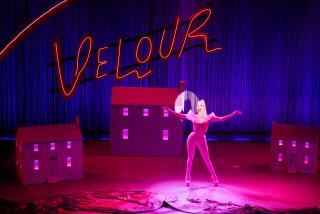Bill limiting drag shows in Kentucky sparks chants of ‘shame’ from foes

- Share via
FRANKFORT, Ky. — Republican lawmakers on Thursday advanced a state bill aimed at putting limits on drag shows in Kentucky, sparking chants of “shame” from opponents who decried the measure as discriminatory and said it would stifle First Amendment rights.
“This bill not only compromises or asks me to explain my humanity, but it also brings into question my livelihood,” drag performer Poly Tics told a GOP-led Kentucky Senate committee, which voted to advance the measure a few minutes later.
The measure would prohibit drag shows on public property or in places where the adult performances could be viewed by children.
“This bill is not anti-LGBTQ,” said Republican Sen. Lindsey Tichenor, its lead sponsor. “This bill is pro-children. For some reason, people want this type of content in front of children. And I would dare ask, why? Why do we need to sexualize our children?”
Violations of the bill would be punishable as misdemeanors for the first two offenses but would rise to a felony for subsequent offenses. Businesses hosting such performances could have their alcohol and business licenses suspended or revoked.
Pope Francis, the head of the Anglican Communion and the top Presbyterian minister have spoken out on LGBTQ rights.
Across the country, conservative activists and politicians complain that drag shows are contributing to the “sexualization” or “grooming” of children. The Tennessee Legislature recently became the first in the country to pass a bill banning public drag performances by classifying them as adult cabaret, among topless dancers, go-go dancers, exotic dancers and strippers.
Several other states, including Idaho, North Dakota, Montana and Oklahoma, are considering similar bans.
After a lengthy discussion that at times turned emotional, the Kentucky Senate committee sent the measure to the full Senate. If it passes there, it would still need House approval. Republicans have supermajorities in both chambers.
The committee voted to scale back the bill from its original version, which would have imposed stricter location restrictions on where drag shows could occur. Despite the changes, opponents continued to raise constitutional questions about the measure.
“Our concern remains that this will include some censorship from the government that is not in compliance with our 1st Amendment-protected rights,” said Kate Miller with the American Civil Liberties Union of Kentucky.
The proposal — Senate Bill 115 — remains discriminatory despite the revisions, said Bob Heleringer, who represented the Fairness Campaign, an LGBTQ advocacy organization.
“And an ounce of discrimination is the same as an ocean of discrimination,” said Heleringer, a Republican and a former Kentucky lawmaker.
The legislation takes aim at drag shows by referring to adult performances as a “sexually explicit performance” that includes a performance involving male or female impersonators.
David Walls, executive director of the Family Foundation, praised the bill as a “straightforward, common sense and necessary” effort to protect children.
“Let’s state the obvious: Sexually explicit adult performances should not take place on public property and should not be anywhere near children, and SB115 would help protect our children from these performances,” Walls said.
Drag performer Poly Tics later told lawmakers the bill was an attack on her livelihood.
“As a drag performer who depends on drag shows ... for income, this bill not only tells me that I am not really a human worthy of rights, but I’m also not worthy to work and I’m not deserving of an ability to make money,” she said.
A few minutes later, the committee’s Republican members advanced the bill. After the vote, the bill’s opponents started chanting “shame.” The chanting continued as the committee chairman called up another bill to be considered. The opponents eventually left the committee room.
More to Read
Sign up for Essential California
The most important California stories and recommendations in your inbox every morning.
You may occasionally receive promotional content from the Los Angeles Times.










